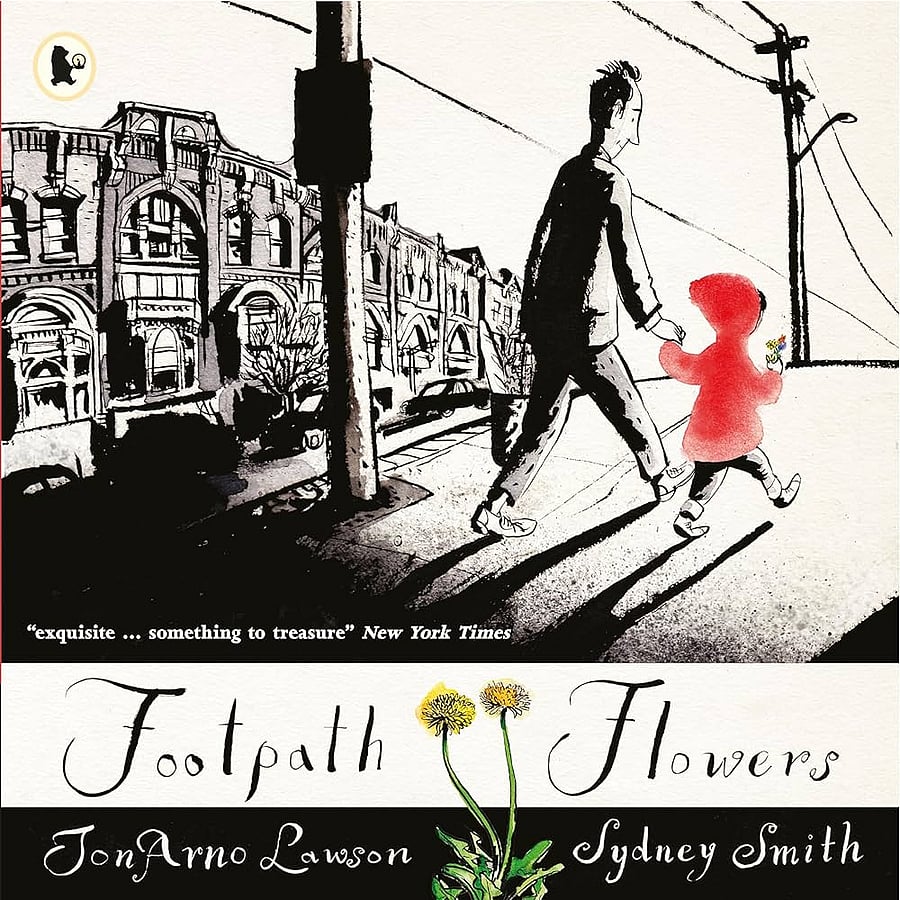Shakti Swaminathan
On a walk with her distracted father, a little girl collects wildflowers — from the cracks of the sidewalk, hidden under poles and emerging out of crevices — in places where people don’t look. Each flower the girl collects becomes a gift for an animal or person she meets on the way. Irrespective of whether the gift is noticed or ignored, the act of giving transforms the girl and the person receiving it. This is the story of Footpath Flowers, a beautifully illustrated picture book by award-winning poet JonArno Lawson and artist Sydney Smith. Footpath Flowers is also a wordless picture book — a book devoid of any text that uses only its beautiful watercolour-like visuals to move the narrative forward.
Wordless picture books originated as educational tools for children who hadn’t started reading yet. They were used in literacy programmes and helped to gently nudge emerging readers, especially the reluctant ones. These books helped build a positive literary experience without the stress of reading words and reading levels. The absence of words allows children of all ages and even adults to ‘read’ these picture books.
At first glance, most children are surprised when they encounter a wordless book. They associate books with long sentences and learning. But as they spend time flipping through the pages, they realise that these books offer an alternative way of experiencing the story and more importantly, give children the agency to decide and frame their own narrative. The lack of an accompanying text allows the child to create their own story and the freedom to construct a different story every time they pick up the book. They even get to decide how long or short it’s going to be.
A favourite wordless picture book among many Indian children, Ammachi’s Glasses by Priya Kuriyan begins with Ammachi waking up one morning and finding her spectacles missing. Ammachi can’t quite see without them and her whole world turns topsy-turvy. She washes the cat instead of her clothes and wrings him out to dry. She squeezes herself into her granddaughter’s clothes instead of hers and almost gulps down a spider — there is mischief spilling out of every page! Ammachi’s Glasses’ colourful illustrations are filled with intricate details making the process of reading it a rich sensorial experience — going through the book panel by panel and absorbing the details and colours while questioning why the artist chose to draw it a certain way or add a particular detail.
A city street slowly awakens — commuters pass by, grocers open up their shops, people are busily scrambling to work and a brightly lit marquee announces the coming of the Garibaldi Circus. A little girl watches a worker put up posters for the circus’s various acts, and her joyful gaze finds the circus in the everyday actions of people in the city. A construction worker balances on girders like a tightrope walker. Two boys on skateboards clown around in the marketplace. A pancake flipper transforms into a juggler. Through its soft, borderless and bright illustrations, Sidewalk Circus by Paul Fleischman and Kevin Hawkes is an ode to the power of imagination and spurs a similar experience in the child reading it. The reader looks at everything with a new eye and must interpret the character’s actions, feelings, and motivations without text to affirm.
When read together by a parent and child, wordless picture books provide an interactive experience. The child can narrate the story using their own words, prompted by questions such as “What is happening here?”, “Who is this?” and “What’s going to happen next?” Children and adults can form sequences together, make sounds, act out the plot and as extension activities, pick a page from the book and write their own story or draw speech bubbles and fill them in.
Although wordless books may seem open-ended and ambiguous, therein lies the beauty of these books — giving space for imagination, scope for creativity and illuminating the importance of small things and small gestures.
The author is a one-part writer, a three-part teacher and a complete mental glutton.
Piqued is a monthly column in which the staff of Champaca Bookstore bring us unheard voices and stories from their shelves.
